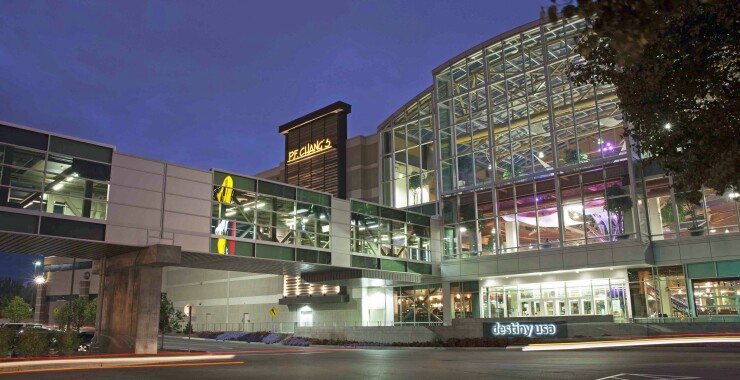Bondholders who helped finance an expansion of Destiny USA in Syracuse face increased risks to their investments amid the coronavirus-driven shutdown of New York State’s largest mall.
Rob Arscott, an assistant professor of finance at Syracuse University’s Martin J. Whitman School of Management, said that the mall’s inability to fully operate the past three months increases concerns that Destiny USA’s owner, Pyramid Management Group, will alter its strategy at a determent to bond investors.

He said the lost business has hampered Pyramid’s ability to fund debt service obligations on payment-in-lieu-of-taxes-backed revenue bonds issued by the Syracuse Industrial Development Agency in 2007 to finance an 874,200-square-foot expansion.
“If I’m an investor I’m concerned that the owner is going to start to behaving in a way that is negative by taking risks with the property, “ Arscott said. “It’s not a question of if the bonds are going to be impaired; it’s just a question of how much.”
Arscott noted that Destiny is likely facing a grim future even after the pandemic subsides given the troubled state of two of its anchor businesses, JCPenney and Lord & Taylor. Large vacancies could lead to Pyramid accelerating some of its past efforts to draw in more entertainment options that Arscott said would be less beneficial to the many small retail shops inside the mall.
“If you replace JCPenney with go-karts or a Dave and Busters it is not going to draw the same foot traffic to these stores,” Arscott said. “There isn’t the same synergy with entertainment and shopping.”
Destiny, which already
Destiny’s closing since has also exacerbated dangers of Pyramid defaulting on $430 million in commercial mortgage-backed security loans issued for the expansion that were securitized by JPMorgan Chase Bank. The CMBS loans were originally due in March 2019 and then transferred to mortgage servicer, Wells Fargo Bank, which provided a conditional extension, if improved financial metrics were met.
Pyramid received another extension into October on the CMBS loans before their maturity date on June 6 and Arscott said the process may get extended further in order to avoid further risks of another operator taking over the property who lacks experience running a mall.
“People are going to try and hang on as long as they can and hope that there is more clarity in the fall,” Arscott said. “They are kicking the can down the road and don't want the task of finding another mall operator since that takes a special skill set."
The Pyramid press office did not immediately respond for comment on the status of reopening the mall or its extension on the CMBS loan.
Dan Berger, senior market strategist at Refinitiv’s Municipal Market Data, said pre-pandemic obstacles at Destiny that were compounded by the virus have heightened investor concerns.
Around $32 million of the Syracuse IDA Carousel Center Project PILOT tax-exempt revenue bonds were traded on April 3 and April 6 at junk-level spreads between 425 and 500 basis points above the triple-A scale, according to Berger. In February prior to the pandemic, the bonds traded at spreads between 150 and 160 bp.
“Concerns about the disease and the mall not attracting visitors have spooked investors,” Berger said. “It’s extremely challenging to access these bonds even under normal conditions and under these conditions it is especially challenging.”
Fitch Ratings
Moody’s Investors Service lowered the same bonds by one notch to Ba3 from Ba2 and placed them on review for further downgrade on April 17, then resolved that review June 11 by downgrading the bonds to B1 from Ba3, and assigning a negative outlook.
Pyramid pays fixed annual PILOT payments to fund debt service obligations on the bonds, which mature in 2036. The city of Syracuse and Onondaga County waived their right to the PILOT payment funding as part of the terms for issuing the debt.
Correction: The original version of the story did not include the latest Moody's rating action, a downgrade to B1 on June 11.





